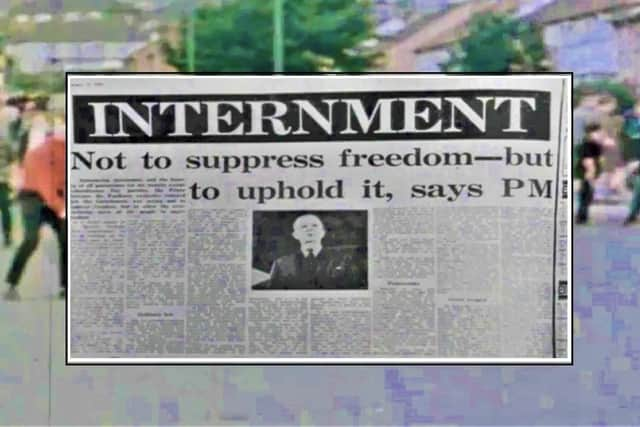Ex-Provo contrasts ‘hooded men’ case with IRA brutality


Shane Paul O’Doherty, a republican bomber who went on to repent and embrace Christianity, was commenting in the wake of a decision by the Supreme Court on Wednesday, which effectively ordered the PSNI to further investigate the ill-treatment meted out to the ‘hooded men’ half a century ago.
The ‘hooded men’ refers to a 14-strong group who were detained by the security forces in 1971 after the introduction of internment and subjected to extremely harsh interrogations, including sleep deprivation and mock-executions.
Advertisement
Hide AdAdvertisement
Hide AdThis latest instalment of their campaign has its roots in 2014, when RTE broadcast a documentary about their case that included reference to something called the ‘Rees Memo’ – a government communique that was said to refer to UK ministers sanctioning torture.
Following the broadcast the PSNI considered whether there was sufficient evidence to warrant a new investigation, but concluded there was not.
This decision has since been ruled unsound – most recently by the Supreme Court which called the decision of the PSNI to drop the case “irrational”.
These most recent court proceedings were in the name of Francis McGuigan, arguably the most prominent of all the ‘hooded men’.
Advertisement
Hide AdAdvertisement
Hide AdAfter the judgment on Wednesday, Mr McGuigan said: “I haven’t lived a normal life, I have lived with this for the past 50 years. I still have nightmares. I have been getting counselling on and off for 40 years.”
What is sometimes left unmentioned in coverage of this story (and by Amnesty International which has championed his cause) is that Mr McGuigan was himself a leading member of the Belfast IRA.
Who is Francis McGuigan? Click here: Former IRA ‘folk hero’ is ‘hardly fitting face for Amnesty International campaign’ say unionists
Reflecting on this, Mr O’Doherty told the News Letter that this latest set of proceedings serves to highlight the “hypocrisy” of the IRA.
Advertisement
Hide AdAdvertisement
Hide AdHe said: “The body that has always regarded itself as the true provisional government of Ireland, awaiting its rightful restoration to power – the PIRA – had no hesitation in adopting techniques of inhuman and degrading treatment of its abducted and interrogated prisoners ...
“Men, youths and women were subjected to extreme torture prior to being extra-judically ‘executed’ with their bodies dumped on border roads or city streets.
“Many of their corpses were ‘disappeared’ so that their relatives could not bury them.”
Mr O’Doherty lamented what he called a lack of interest by governments “in bringing the IRA’s known leadership to the International Criminal Court at the Hague for war crimes” – in contrast to the time and money spent examining the mistreatment of people by security forces.
Advertisement
Hide AdAdvertisement
Hide AdDuring the Troubles, roughly 60% of killings were carried out by republican paramilitaries, 30% by loyalist paramilitaries, and the remaining 10% by the security forces.
However, out of this last 10%, perhaps as much as half of the fatalities were paramilitaries, many killed in the process of preparing an attack or in gunfights with the army.
More from this reporter:
——— ———
A message from the Editor:
Advertisement
Hide AdAdvertisement
Hide AdThank you for reading this story on our website. While I have your attention, I also have an important request to make of you.
With the coronavirus lockdowns having had a major impact on many of our advertisers — and consequently the revenue we receive — we are more reliant than ever on you taking out a digital subscription.
Subscribe to newsletter.co.uk and enjoy unlimited access to the best Northern Ireland and UK news and information online and on our app. With a digital subscription, you can read more than 5 articles, see fewer ads, enjoy faster load times, and get access to exclusive newsletters and content.
Visit
https://www.newsletter.co.uk/subscriptionsnow to sign up.
Our journalism costs money and we rely on advertising, print and digital revenues to help to support them. By supporting us, we are able to support you in providing trusted, fact-checked content for this website.
Ben Lowry, Editor